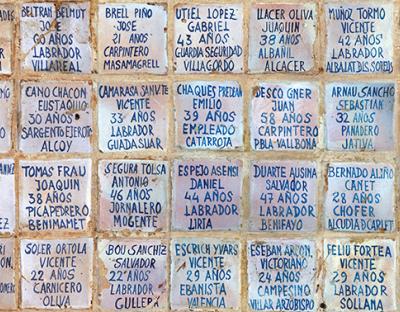he Graves of Francoism (Las fosas del Franquismo) is a project with a public service vocation that aims to promote democratic memory. Society has a moral obligation to undo the base of oblivion in order to never again repeat the most tragic episodes of our history. The project is multidisciplinary in nature, as it is approached from the perspective of archaeology, anthropology and historical memory.
The Diputación de València, with the Historical Memory Delegation, and the Department of Culture, with the Museums of Prehistory and L'ETNO, have produced two exhibitions, a publication and a programme of cultural activities, which aim to contribute to the truth, justice and reparation of the memory of the people shot in the Paterna Cemetery between 1939 and 1956. Special attention has been devoted to the victims and their families.
The exhibitions are: Archaeology of Memory. The Graves of Paterna (Arqueología de la Memoria. Las fosas de Paterna), organised by the Museum of Prehistory of Valencia, and 2238 Paterna. A place of perpetration and memory (2238 Paterna. Lugar de perpetración y memoria), organised by L'ETNO, Museu Valencià d'Etnologia, which will help to strengthen critical thinking in the face of events that should never be repeated.
2238 Paterna. A place of perpetration and memory.
Approaching the contemporary exhumations of the graves of victims of Franco's regime from the perspective of social anthropology allows us to look beyond these graves. From this discipline, the analytical focus is placed on understanding in depth and in all its dimensions the dynamic social world that surrounds them and endows them with meaning, whether in institutional, associative or family environments.
From this point of view, exhuming involves much more than digging up bones. The view widens and allows us to introduce new agents, to move through time and space and to put ourselves in the place of those people who were murdered and humiliated by Franco's repression, as well as to walk with them along the paths of memory and oblivion.
All these issues are present in one way or another in the exhibition 2238. Paterna, Place of Perpetration and Memory, organised by L'ETNO. Through different spaces and periods, it takes us from the past to the present, from the houses and locked chests of drawers to the cemetery of Paterna and inside the graves, from the experiences of several generations to the suffering of men and women repressed for their way of thinking and living, for defending the legitimate government or for their political militancy.
In the first room (Room 2) we enter a mass grave. From inside, we are led to reflect on its existence and the reasons for the current demands for exhumations, thanks, above all, to the transmission of memory by women.
The first courtyard recreates the Paterna cemetery, showing us the spaces, the small and humble family tributes, the different political demands that have taken place there over time up to the present day.
In the second courtyard we can stop to assimilate all that we have been shown, digest the violence and fear of so many families and share the seeds of hope that encapsulate their demands.
This project is the result of the joint effort and work of many people: the curator, the person responsible for the design, the institution and its workers (restoration, conservation, communication, didactics, administration and management...). And, of course, it is the fruit of the generosity of the families who have selflessly allowed their private and intimate memory to become public heritage and collective memory.
Consult the brochure of complementary activities in the right-hand column.
